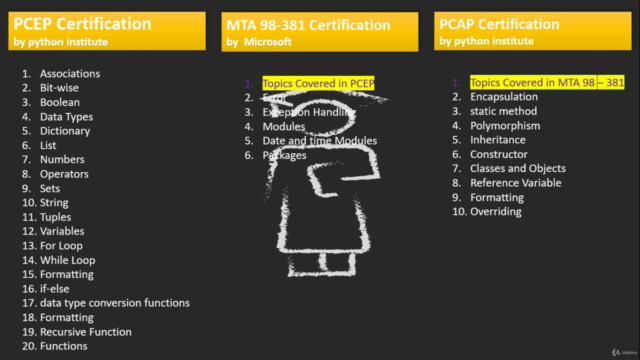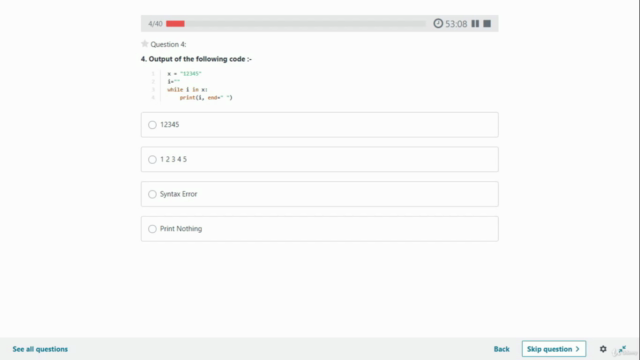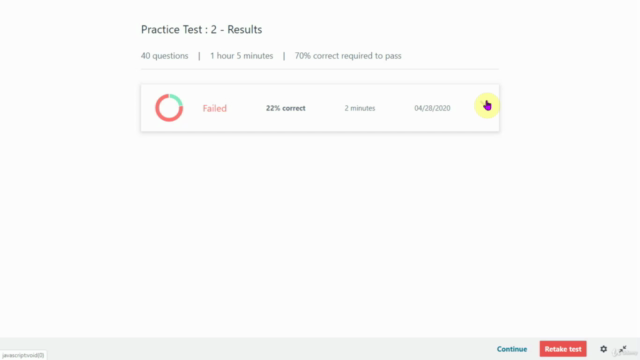PCAP Certification-Certified Associate in Python Programming
Pass PCAP-31-02 Exam. Get hard level of python questions for all topics with detailed and clear explanation
4.19 (156 reviews)

4 751
students
240 questions
content
Nov 2020
last update
$13.99
regular price
Why take this course?
- What is the main purpose of the
input()function in Python?
# Correct answer: input() function reads a line from input and returns it as a string.
user_input = input("Enter your name: ")
print(f"Hello, {user_input}!")
- How do you convert a string to uppercase in Python?
# Correct answer: Using the `upper()` method.
my_string = "hello world"
print(my_string.upper()) # Outputs: HELLO WORLD
- What function would you use to append an element to a list in Python?
# Correct answer: Using the `append()` method of the list object.
my_list = [1, 2, 3]
my_list.append(4)
print(my_list) # Outputs: [1, 2, 3, 4]
- Which method would you use to sort a list in Python?
# Correct answer: Using the `sort()` method of the list object.
my_list = [5, 2, 9, 4, 7]
my_list.sort()
print(my_list) # Outputs: [2, 4, 5, 7, 9]
- What is the difference between a package and a module in Python?
# A package is a directory containing both __init__.py and a file named __package__.py (which can be empty), allowing for importing of its contents without having to specify the sub-package level (e.g., import mypkg.subpkg). Modules are files containing Python definitions such as functions or classes.
- What is the purpose of the
__init__.pyfile in a package?
# The __init__.py file signals to Python that the directory should be treated as a package, and thus makes all of its contents available for import. This can also be an empty file or even just a blank line within it.
- Explain the concept of inheritance in Python with examples.
# Inheritance allows a class to inherit attributes and methods from another class, called the parent or superclass.
class Parent:
def __init__(self, name):
self.name = name
def greet(self):
return f"Hello, {self.name}"
class Child(Parent): # Child class inherits from Parent
def __init__(self, name, favorite_color):
super().__init__(name) # Call Parent's __init__ method
self.favorite_color = favorite_color
def favorite_greeting(self):
return f"{Parent.greet(self)} and my favorite color is {self.favorite_color}."
child_instance = Child("Alice", "blue")
print(child_instance.greet()) # Outputs: Hello, Alice
print(child_instance.favorite_greeting()) # Outputs: Hello, Alice and my favorite color is blue.
- What is the purpose of the
print()function in Python?
# Correct answer: The `print()` function displays a line of output to the terminal window (or other standard output destination). By default, it ends the line with a newline character and adds a space between objects unless at least one of them is a string type.
print("Hello, Python world!")
- How would you convert a list to a dictionary in Python where the list contains tuples?
# Correct answer: Using a dictionary comprehension or the `zip()` function along with the `dict()` constructor.
my_list = [("a", 1), ("b", 2), ("c", 3)]
my_dict = dict(my_list)
print(my_dict) # Outputs: {'a': 1, 'b': 2, 'c': 3}
- What is the purpose of exception handling in Python using
try,except,else, andfinallyblocks?
# Exception handling allows you to write code that can gracefully handle errors (exceptions) without crashing the entire program. It involves catching exceptions, providing alternative code to run, and cleaning up resources regardless of an exception occurring.
try:
result = 10 / 0
except ZeroDivisionError as e:
print("Zero division error caught:", e)
else:
print("Result without error:", result)
finally:
print("This block will always execute, regardless of the exception handling outcome.")
These questions and answers are representative of the types of knowledge you would need for the PCAP-31-02 exam. Remember to practice with real exam questions and to understand the Python documentation for more detailed explanations of each concept.
Course Gallery




Loading charts...
Related Topics
2808055
udemy ID
11/02/2020
course created date
02/03/2020
course indexed date
Lee Jia Cheng
course submited by